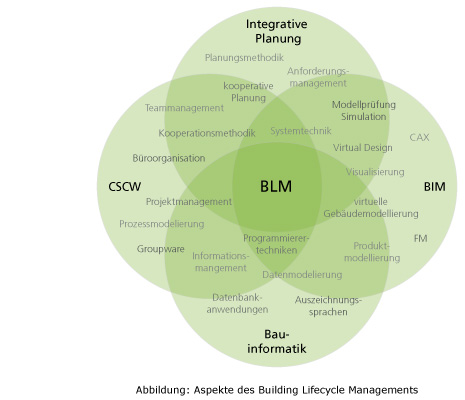Department
The Department of Building Lifecycle Management - BLM was spun off from the Institute for Industrial Building Construction (ifib) in early 2010 in the wake of the restructuring of the architecture faculty.
In research and teaching, the BLM focuses on the influence of information technologies on design, construction and use processes. The development, application and transfer of integrative computer-assisted planning and cooperation methods - in the sense of integrated building lifecycle management (BLM) - and the development and application of corresponding data models and IT tools are key departmental approaches.
The targets, firstly, are the development of methods and tools to increase project and process quality as well as planning efficiency, and, secondly, with respect to sustainable, goal- and requirement-oriented planning to improve the quality of the product or design object itself over its entire lifecycle.
The interdisciplinary employee structure of the BLM enables the coupling of integrative systemic approaches with detailed specialist knowledge.

With the increasing complexity of the problem area, the integration and creation of compatibility is becoming an increasingly important factor. Especially in the context of growing spatially-distributed cooperation, cross-discipline or cross-application interaction and integration are becoming of core importance for the success of construction-related cooperation. The logistical optimization of the cooperation through the IT-based linking of the participating systems, actors, resources and processes represents a core approach to increasing overall process transparency and efficiency and to improving sustainable planning, construction, and use quality. Building Lifecycle Management (BLM) implies the integration of all processes, skills and information created in the system lifecycle at the object/system and process levels. BLM is therefore not to be understood as an IT solution, but as a strategy that is supplemented by appropriate methodological and organizational concepts. Integral planning approaches serve as a model and methodological basis in this. The added value of this integrated approach lies in its optimization potential at the overall process level. The development of methods and IT tools in the BLM area will therefore most likely lead to the creation of significant added value for the construction industry. In addition, its application will enable current planning methodology and execution practices to be improved. As a result, the quality of the building stock with respect to sustainability will be increased.
